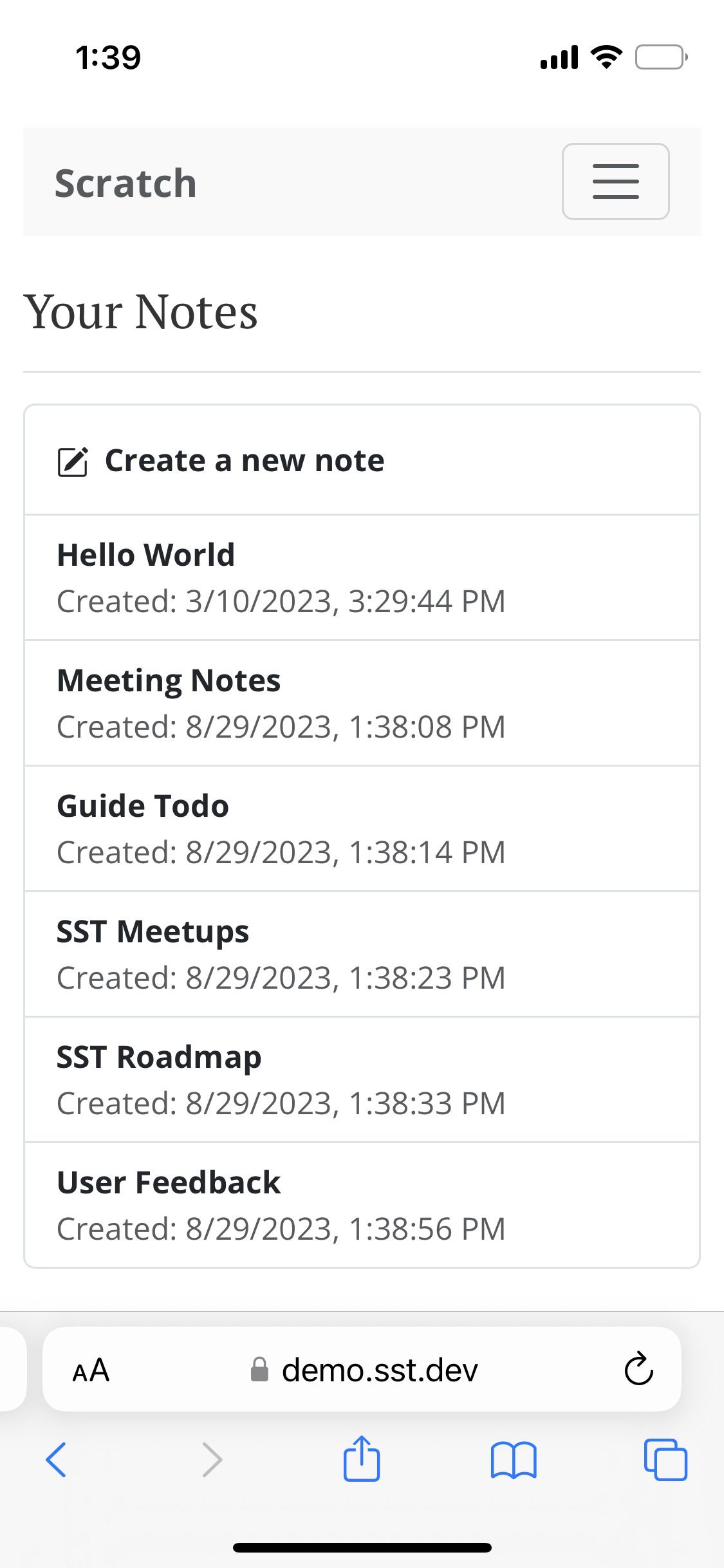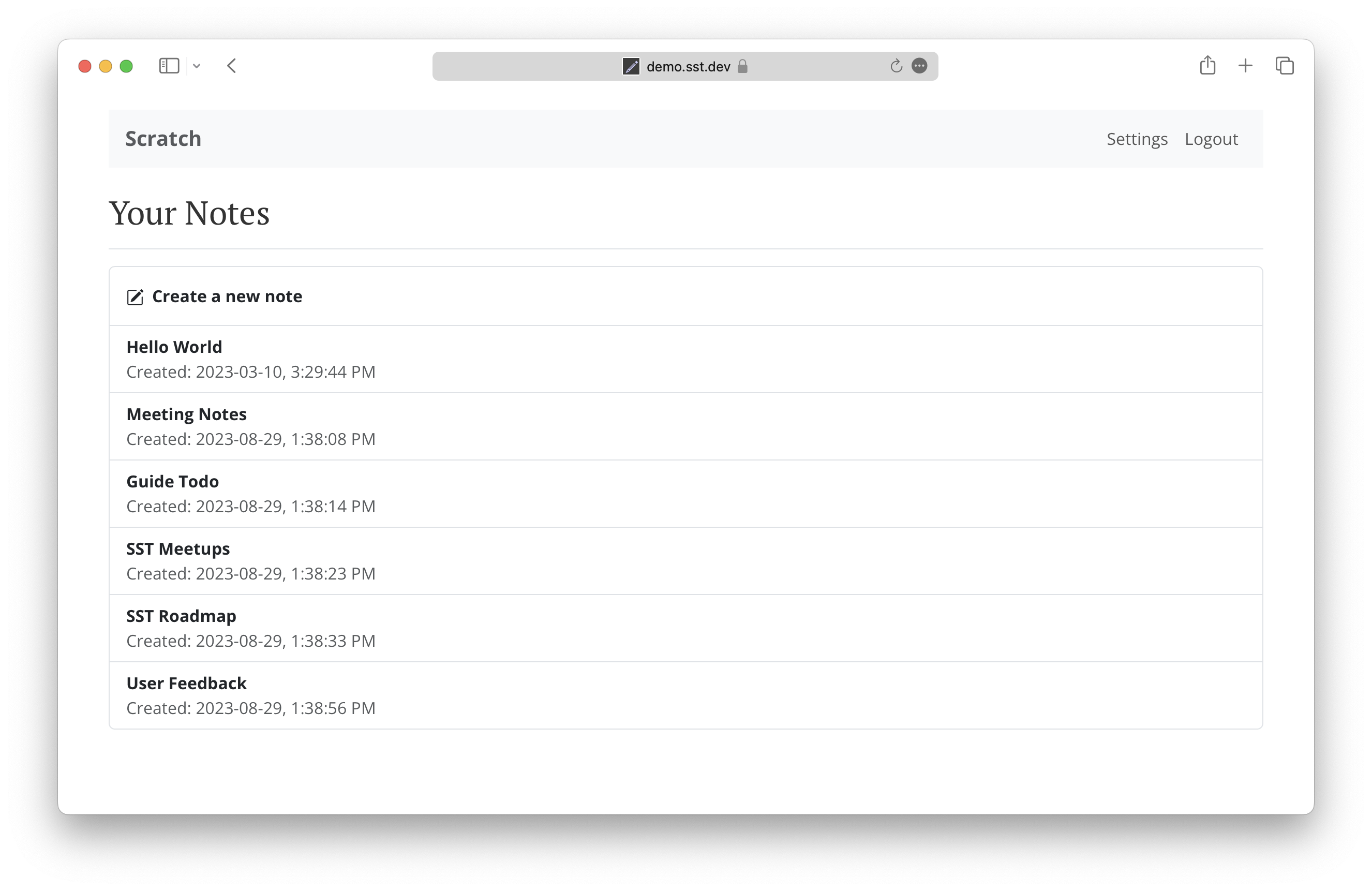What Does This Guide Cover?
To step through the major concepts involved in building web applications, we are going to be building a simple note taking app called Scratch.
However, unlike most tutorials out there, our goal is to go into the details of what it takes to build a full-stack application for production.
Demo App
The demo app is a single page application powered by a serverless API written completely in TypeScript.

It is a relatively simple application but we are going to address the following requirements.
- Should allow users to signup and login to their accounts
- Users should be able to create notes with some content
- Each note can also have an uploaded file as an attachment
- Allow users to modify their note and the attachment
- Users can also delete their notes
- The app should be able to process credit card payments
- App should be served over HTTPS on a custom domain
- The backend APIs need to be secure
- The app needs to be responsive
- The app should be deployed when we
git push
Demo Source
Here is the complete source of the app we will be building. We recommend bookmarking it and use it as a reference.
We will be using the AWS Platform to build it. We might expand further and cover a few other platforms but we figured the AWS Platform would be a good place to start.
Technologies & Services
We will be using the following set of technologies and services to build our serverless application.
- AWS
- S3 for file uploads
- DynamoDB for our database
- Lambda & API Gateway for our serverless API
- Cognito for user authentication and management
- React for our frontend
- Bootstrap for the UI Kit
- React Router for routing
- Vite for building our single page app
- Vitest for our unit tests
- GitHub for hosting our project repos
- Stripe for processing credit card payments
We are going to be using the free tiers for the above services. So you should be able to sign up for them for free. This of course does not apply to purchasing a new domain to host your app. Also for AWS, you are required to put in a credit card while creating an account. So if you happen to be creating resources above and beyond what we cover in this tutorial, you might end up getting charged.
While the list above might look daunting, we are trying to ensure that upon completing the guide you will be ready to build real-world, secure, and fully-functional web apps. And don’t worry we will be around to help!
Requirements
You just need a couple of things to work through this guide:
- Node v20 and npm v10
- A GitHub account
- Basic knowledge of JavaScript and TypeScript
- And basic knowledge of how to use the command line
How This Guide Is Structured
The guide is split roughly into a couple of parts:
For the backend:
- Configure your AWS account
- Create your database using DynamoDB
- Set up S3 for file uploads
- Write the various backend APIs
- Set up Cognito User Pools to manage user accounts
- Set up Cognito Identity Pool to secure our resources
- Working with secrets
- Adding unit tests
For the frontend:
- Set up our project with Create React App
- Add favicons, fonts, and a UI Kit using Bootstrap
- Set up routes using React Router
- Use AWS Cognito with Amplify to login and signup users
- Plugin to the backend APIs to manage our notes
- Use the AWS Amplify to upload files
- Accepting credit cards with the Stripe React SDK
Deploying to prod:
- Use a custom domain for your app
- Deploy your app when you push to git
We believe this will give you a good foundation on building full-stack production ready serverless applications. If there are any other concepts or technologies you’d like us to cover, feel free to let us know on Discord .
For help and discussion
Comments on this chapter